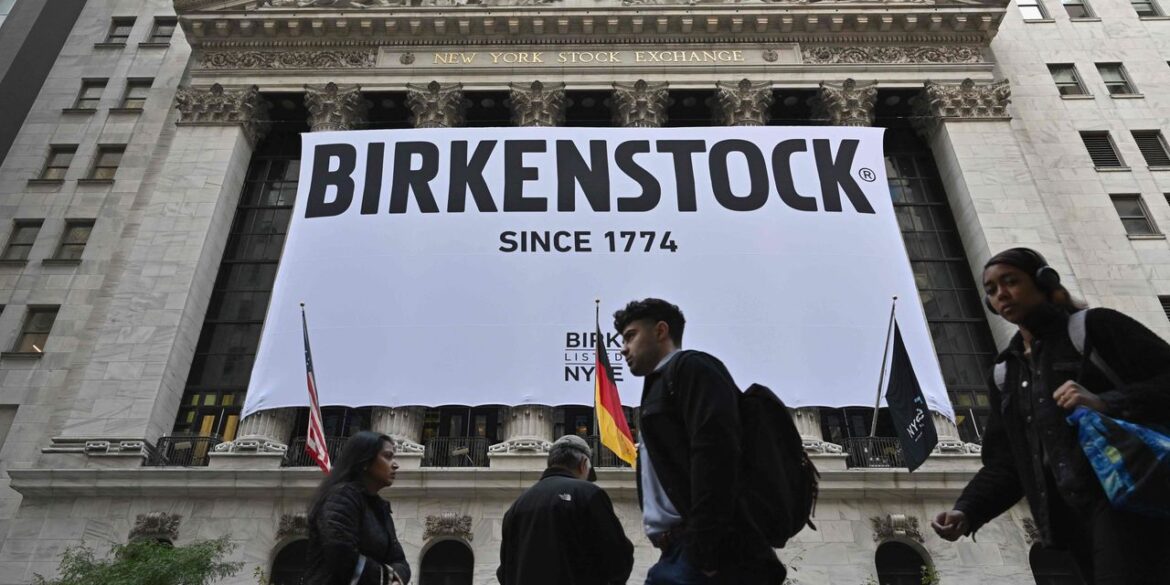 According to a recent Form N-1A, Grayscale has approached the U.S. Securities and Exchange Commission (SEC) with a proposal for a unique exchange-traded fund (ETF) dedicated to the privacy and cybersecurity realm. The Grayscale Privacy ETF aims to be the first to encapsulate the burgeoning sector of privacy technology and cybersecurity. Privacy Takes Center Stage […]
According to a recent Form N-1A, Grayscale has approached the U.S. Securities and Exchange Commission (SEC) with a proposal for a unique exchange-traded fund (ETF) dedicated to the privacy and cybersecurity realm. The Grayscale Privacy ETF aims to be the first to encapsulate the burgeoning sector of privacy technology and cybersecurity. Privacy Takes Center Stage […]
Source link
debuts
Birkenstock’s IPO was one of the worst debuts for a billion-dollar deal in a decade
The initial public offering of German footwear company Birkenstock Holdings Ltd. marked one of the worst debuts for a billion-dollar deal of the last decade, according to Renaissance Capital.
Birkenstock
BIRK,
ended its first day of trading down 12.9% and was down 21% by the end of the week, according to Bill Smith, founder and CEO of Renaissance, a provider of IPO exchange-traded funds and institutional research.
Of the 95 IPOs that have raised at least $1 billion in the past 10 years, only five have performed worse than Birkenstock on their first day of trade. The deal was the worst since AppLovin
APP,
in April of 2021, which ended its first day of trade down 18.5%.
“Larger IPOs are generally at a lower risk of immediately breaking issue: only 20% of the past decade’s billion-dollar IPOs closed negative on the first day, compared to 27% for all IPOs,” Smith wrote in commentary.
For more, read: Birkenstock’s stock falls nearly 13% in trading debut, ends well below IPO price
Birkenstock was up 4.5% on Monday, putting it on track for its first gain since the IPO, if the gains hold through the close, while still well below its issue price.
As for the current state of the IPO market, Smith called poor aftermarket returns an “autocorrect feature” a week ago.
“This week we saw it in action. Until now, getting an allocation on a big IPO meant a first-day pop. But after getting burned on multiple deals, aftermarket buyers didn’t show up this time,” he wrote.
In the case of Birkenstock, valuation “was also a sticking point.” The company priced its deal just below the midpoint of its price range at $46, for a valuation of $8.6 billion, which put it at the top of its peer group on a forward price/earnings ratio basis.
“The company has great fundamentals, but investors need to see it execute to get that kind of elite multiple,” said Smith.
The hot money is gone, “but there’s still plenty of investor demand for solid companies at reasonable prices. It’s not the new normal, it’s the old normal (pre-2020).”
For now, weak companies cannot go public and strong ones are seeking valuations they can’t achieve.
“Against a backdrop of IPO turbulence, wars abroad, and a bond market meltdown, many IPO hopefuls have soured on Q4, but we’re not counting out the quarter just yet,” he said.
There are no deals on tap for this week, unless some smaller companies opt to join the calendar.
Chromocell Therapeutics Corp.
CHRO,
a clinical-stage biotech focused on pain treatments, set terms for its IPO early Monday, clearing the way for its roadshow.
The company plans to offer 4.3 million shares priced at $4.50 to $5.50 a pop to raise up to $23.7 million at a valuation of up to $37.9 million. Titan Partners Group is underwriting the deal.
The lockup period for two recent deals expired allowing analysts to publish research on grocery-deliver app Instacart
CART,
which trades as Maplebear, and Klaviyo Inc.
KVYO,
a digital-ad provider.
Instacart is trading below its $30 issue price, but analysts are mostly bullish. At least six established coverage with buy-equivalent ratings, according to FactSet, while another took a more neutral stance.
Read now: An Uber in the making? Here’s how Instacart’s stock could see better days ahead.
Klaviyo, which is holding just above its $30 issue price, garnered eight buy-equivalent ratings on Monday and two holds.
The Renaissance IPO ETF
IPO
has gained 25% in the year to date, while the S&P 500
SPX
has gained 12.7%.
For more, see: Birkenstock is going public: 5 things to know about the iconic German sandal maker’s IPO designs
Also: Esports company Gamer Pakistan stock becomes the first entity from that country to list on a U.S. exchange

The web platform Opera has revealed its plans to launch a noncustodial stablecoin wallet integrated into its mobile web browser that will be made available to its user base in Africa.
On Sept. 13, Opera introduced MiniPay, which is built on the Celo blockchain and will allow African users to send or receive stablecoins using their existing mobile numbers.
Exciting news live from @dappcon_berlin‘s mainstage! cc: @RegenRene @jorgenarnesen @afishinparis Charles Hamel & Rosette Belesi.
It’s finally here! We’ve partnered with global web innovator @Opera to launch @MiniPay––a first-of-its-kind stablecoin wallet built on Celo to onboard… pic.twitter.com/sEUp0yCKQe
— Celo (@CeloOrg) September 13, 2023
Opera began operating in Africa 17 years ago and now has over 100 million users on the continent. The launch of MiniPay will begin in the coming months and first start in Nigeria.
Jørgen Arnesen, executive vice president for mobile at Opera, commented:
“Users in Nigeria, Kenya, Ghana, and South Africa have indicated lingering concerns about high fees, unreliable service uptimes, a lack of transparency around transaction progress and a lack of access to mobile data.”
The new MiniPay wallet will operate with sub-cent fees and onboard and back up wallets through users’ Google credentials.
It also has integrated with local payment methods, including Airtime and M-Pesa, along with traditional bank transfers to allow users to add and withdraw stablecoins from the wallet into a local currency.
Arnesen told Cointelegraph that Opera developed the MiniPay browser as a “unique, data-saving technology that allows users to surf the web and gain access to information without having to expend a major part of their monthly income.”
Related: Google Chrome launches built-in user tracking for advertisers
Celo also has a strong African user base and said the integration “opens the door” for more Ethereum-compatible decentralized applications to be built for MiniPay.
Arnesen also mentioned that as the product launches, MiniPay will support Mento’s stable Celo Dollar (cUSD), which tracks the value of the U.S. dollar.
“This way, we are not confusing users with multiple currencies at a time, as would be the case in a regular crypto wallet.“
In April, Opera announced a new generative artificial intelligence integration into its then-latest browser update. The in-browser AI feature, called AI Prompt, gives users “contextual prompts” for web pages or highlighted text.
In December 2022, it launched a suite of security tools with the aim of protecting users against “malicious Web3 actors.”
Collect this article as an NFT to preserve this moment in history and show your support for independent journalism in the crypto space.
Magazine: How to protect your crypto in a volatile market: Bitcoin OGs and experts weigh in
McDonald’s Hong Kong has picked The Sandbox to build its first Web3 experience, McNuggets Land, a virtual world dedicated to celebrating Chicken McNuggets’ 40th anniversary.
The experience takes users to a virtual store with a hidden factory and a tour through the history of the chicken snack, allowing gamers to play and complete quests to win rewards, such as The Sandbox (SAND) utility token, which is used to purchase virtual goods and customize avatars on the platform.
Hong Kong users can also win 365-day free Chicken McNuggets coupons for redemption at the chain’s restaurants. To join the virtual world, users only need an email address.

Metaverse experiences have emerged as a tool for brand-building strategies in the past few years, allowing companies to gamify products and services, as well as establish online loyalty programs.
Sebastien Borget, co-founder and chief operating officer of The Sandbox, noted in a statement shared with Cointelegraph that the partnership with McDonald’s takes The Sandbox to “a new level” and brings it “closer to realizing the ultimate goal of mass adoption of the metaverse.”
The giant fast food chain has chosen Web3 tools to engage customers in the past. In 2021, for instance, McDonald’s China released a set of 188 nonfungible tokens to celebrate its 31st anniversary in the local market.
McDonald’s isn’t the first global brand to embrace the virtual world through collaborations with The Sandbox. The Web3 firm has partnered with nearly 400 companies, including Warner Music Group, Ubisoft, Gucci and Adidas, as well as Snoop Dogg, The Smurfs, Care Bears, The Walking Dead and Atari.
“The launch of self-publishing now allows our partners to realize the true potential and monetise their brand in the metaverse by making their customer experience available to everyone, all the time,” said Borget about the recently released feature that allows brands to launch experiences directly on the platform’s map.
Magazine: 4 out of 10 NFT sales are fake: Learn to spot the signs of wash trading




